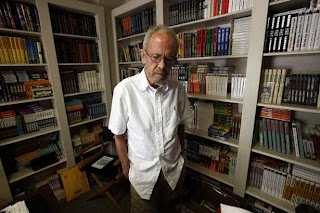“Freaky Deaky” (1988)
Robin said, “I could tell you were a little ripped when you walked in.”
“Not bad. All I had after work was some hash and beer. I’m still geeked on acid, but couldn’t find none. I can get blotter in L.A. once in a while, it’s okay. But old Owsley’s preemo purple or even windowpane, that stuff could get you in touch with your ancestors. ... Acid’s good for you — I mean you don’t overdo it, become a burnout. It’s like laxative for the brain, it mellows you while it cleans out your head.”
Robin sipped her wine. She said, “I have some,” and saw Skip’s sly grin peeking through his beard, a sparkle coming into his pale eyes.
“You know I suffer from anti-acrophobia, fear of not being high.”
Who else?










































